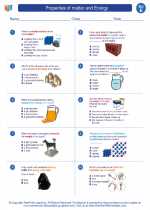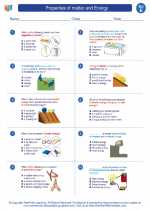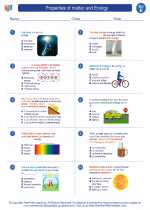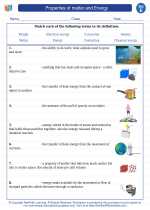Properties of matter and Energy -> physics
Key Concepts in Physics
1. Matter and Energy
Physics explores the nature of matter and energy. Matter is anything that has mass and occupies space, while energy is the ability to do work. The relationship between matter and energy is described by Einstein's famous equation, E=mc^2, which states that energy and mass are interchangeable.
2. Motion and Forces
Physics studies the motion of objects and the forces that cause them to move. The three laws of motion formulated by Sir Isaac Newton are fundamental to understanding how objects move and interact with each other.
3. Thermodynamics
Thermodynamics deals with the study of heat, temperature, and energy transfer. It helps us understand how heat engines work and how energy can be converted from one form to another.
4. Electricity and Magnetism
Electricity and magnetism are essential concepts in physics. They explain the behavior of electric charges and the interaction between magnetic fields and electric currents. Understanding these principles is crucial for modern technology and engineering.
5. Optics
Optics is the study of light and its behavior. It encompasses the study of reflection, refraction, and the behavior of light waves. Understanding optics is essential for the design of lenses, mirrors, and other optical devices.
Study Tips for Physics
1. Understand the Fundamentals
Start by understanding the fundamental principles of physics, such as the laws of motion, conservation of energy, and the nature of waves and particles. These concepts form the basis for more advanced topics in physics.
2. Practice Problem-Solving
Physics involves a lot of problem-solving, so practice solving problems related to motion, forces, energy, and other key concepts. This will help you develop a strong understanding of the principles and their applications.
3. Visualize Concepts
Use diagrams, graphs, and visual aids to help you understand complex concepts in physics. Visualizing the behavior of objects, waves, and fields can make it easier to grasp abstract ideas.
4. Seek Help When Needed
If you're struggling with a particular concept, don't hesitate to seek help from your teacher, tutor, or classmates. Physics can be challenging, but getting assistance can help you overcome difficulties and improve your understanding.
5. Stay Updated with Real-Life Applications
Physics is all around us, so stay updated with the latest developments and real-life applications of physics. Understanding how physics principles are applied in technology, engineering, and everyday life can make the subject more engaging and relevant.
[Physics] Related Worksheets and Study Guides:
.◂Science Worksheets and Study Guides Fifth Grade. Properties of matter and Energy

 Worksheet/Answer key
Worksheet/Answer key
 Worksheet/Answer key
Worksheet/Answer key
 Worksheet/Answer key
Worksheet/Answer key
 Vocabulary/Answer key
Vocabulary/Answer key
 Vocabulary/Answer key
Vocabulary/Answer key
